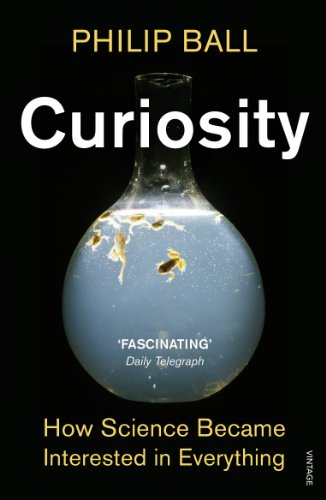Curiosity: How Science Became Interested in Everything - Softcover

Through curiosity, our innocence was said to be lost. Yet this hasn't deterred us. Today we spend vast sums trying to recreate the first instants of creation in particle accelerators, out of pure desire to know. There seems now to be no question too vast or too trivial. No longer reviled, curiosity is now celebrated.
By examining the rise of curiosity from the dawn of modern science to today, we can examine how it functions in science, how it is spun, packaged and sold, and how the changing shape of science influences the kinds of questions it may ask.
"synopsis" may belong to another edition of this title.
(Wall Street Journal)
“Philip Ball’s fascinating book revels not just in the experiments of these early scientists, but also in their humanity, foibles and passions. Curiosity may lead us down blind alleys as often as it enlightens, but Ball shows that it is a vital part of what makes us human.” (Sunday Times (UK))
“Curiosity is a wonderful book that revises popular assumptions about the Scientific Revolution with great wit and insight. . . . Philip Ball wants to retain the excitement and fervor that drove scientific curiosity from the seventeenth century onwards and celebrate the ‘love, the awe, the passion’ that scientists feel but repress in their research because of the curious history of scientific experimentation. In this, Ball distinguishes himself as unquestionably one of our finest—and most curious—writers on the history and future of science." (Literary Review)
“Offers a wide-ranging account of what used to be called the scientific revolution—a term that historians of science now tend to use at arm’s length, wrapping it in quotation marks, for fear of sounding simplistic (or, even worse, triumphalist). Almost everyone of importance between Copernicus and Newton is discussed here, and a great deal of information is imparted in a user-friendly and thought-provoking way.” (Telegraph)
“A wonderfully nuanced and wise study of the scientific revolution. . . . Philip Ball shows that there wasn't just one kind of science in the 17th century: Bacon, Galileo, Boyle and Newton were all doing different things, appropriate to their respective disciplines.”
(Guardian (UK))
“To explain the shift that transformed curiosity from a dangerous temptation to a praiseworthy motivation, Ball revisits the intellectually restless lives of great scientists across the centuries, including Copernicus, Kepler, Galileo, and Newton. But readers soon learn that the work of investing curiosity with a new and positive value also involved astrologers, magicians, courtiers, and mystics. . . . As the story of how a strange coalition of revolutionaries defied traditional restraints on the hunger for new knowledge, Ball’s history of curiosity tells readers much about the dangerous adventure of being a modern human.” (Booklist, starred review)
"Philip Ball possesses the gift of making complicated topics compelling and understandable. A substantial work in the history of science, this engaging title should appeal to serious readers, both academic and armchair.” (Library Journal)
“When we think of curiosity as a motivator for research, quirky or otherwise, we’re assuming a modern definition for the term, something along the lines of 'a desire to know or learn.' And one of the first things we discover in Philip Ball’s engaging, meticulously detailed and abundantly entertaining history Curiosity: How Science Became Interested in Everything is that the word has had many connotations through the ages. . . . This book [is] a joyful feast for the curious among us.”
(Washington Independent Review of Books)
“An entertaining and thorough narrative. . . . I highly recommend Curiosity for anyone interested in science.” (Chemical Heritage)
“In Curiosity: How Science Became Interested in Everything, the science writer Ball, a former editor at Nature, reveals how curiosity, combined with wonder, has driven the scientific enterprise since the seventeenth century, and how the ever-transmuting nature of curiosity shifted the practice of science to the highly specialized and impersonal activity that it is perceived as today. Ball traces the intellectual history of curiosity, from the Renaissance cabinets of curiosity to the Large Hadron Collider at CERN that harks back to a view of nature as holding secrets that must be teased out with experimental apparatuses. He shows how curiosity went from being seen as a vice in medieval Catholic Europe, to a shallow form of inquisitiveness that inspired learned societies like the London philosophical club, and then, in the latter half of the sixteenth century, got recast as a virtue. Changes in the notion of curiosity from vice to virtue, he argues, have gone hand in hand with the development of empirical methods in science.” (New York Review of Books)
“The book is well-documented and exciting, driving the reader to unexpected vistas. His clever approach to complex scientific concepts is hypnotizing, directing our intellectual selves to fresh ideas and new horizons. This book must be read and appreciated.” (San Francisco Book Review)
"About this title" may belong to another edition of this title.
- PublisherVintage
- Publication date2013
- ISBN 10 0099554275
- ISBN 13 9780099554271
- BindingPaperback
- Number of pages480
- Rating
Buy New
Learn more about this copy
Shipping:
FREE
Within U.S.A.
Top Search Results from the AbeBooks Marketplace
Curiosity: How Science Became Interested in Everything [Soft Cover ]
Book Description Soft Cover. Condition: new. Seller Inventory # 9780099554271
Ball, P: Curiosity
Book Description Condition: New. Dieser Artikel ist ein Print on Demand Artikel und wird nach Ihrer Bestellung fuer Sie gedruckt. No longer reviled, curiosity is now celebrated. By examining the rise of curiosity from the dawn of modern science to today, we can examine how it functions in science, how it is spun, packaged and sold, and how the changing shape of science influences th. Seller Inventory # 594353255

